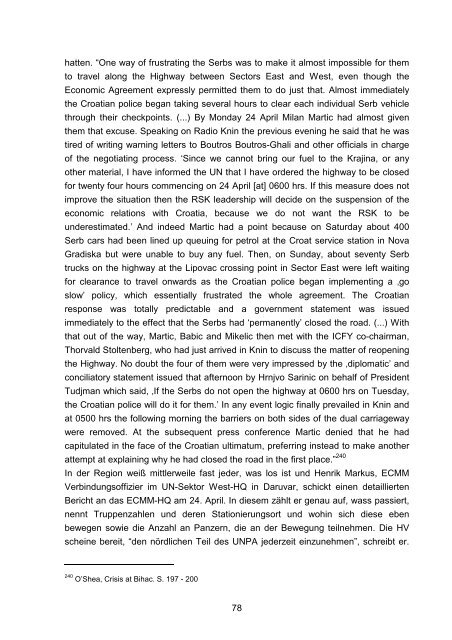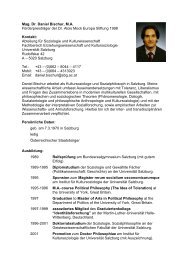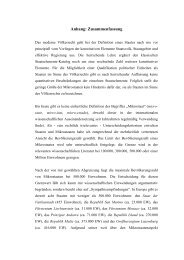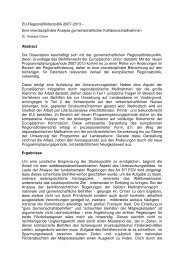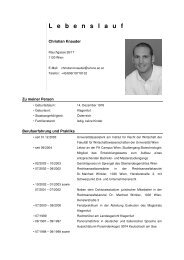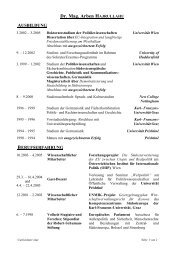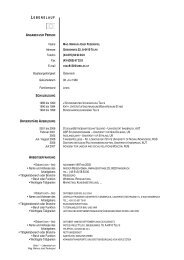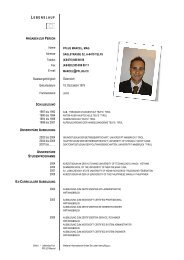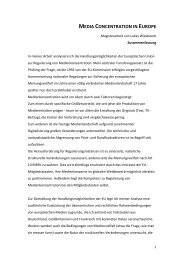- Seite 1 und 2:
Mag. Raphael Draschtak Die militär
- Seite 3 und 4:
I. Vorbemerkungen Die vorliegende A
- Seite 5 und 6:
II. Die Auseinandersetzungen im ehe
- Seite 7 und 8:
freie Hand hatte in einer Politik,
- Seite 9 und 10:
Man konnte zum Helden, man konnte r
- Seite 11 und 12:
entstandene Aggression wurde auch e
- Seite 13 und 14:
Bosnien aktiv. Daß gleichzeitig di
- Seite 15 und 16:
nicht in dem größeren und kultivi
- Seite 17 und 18:
Nach einem Jahr der Auseinandersetz
- Seite 19 und 20:
Dezember 1994 vor dem Ruin der UN w
- Seite 21 und 22:
III. Ein Waffenstillstand, der kein
- Seite 23 und 24:
HVO gewesen. 43 Dennoch - im wesent
- Seite 25 und 26:
ebenfalls als Handelsbase florieren
- Seite 27 und 28: ungenutzt verstreicht, in die Waags
- Seite 29 und 30: wird daher von Tudjman kontaktiert:
- Seite 31 und 32: IV. Ein Krieg geht in die letzte Ru
- Seite 33 und 34: gemeinsamen Oberkommandos zur Koord
- Seite 35 und 36: Alle in der moslemischen Gesellscha
- Seite 37 und 38: Brennpunkte des ersten Vormarsches
- Seite 39 und 40: guarantees a numerical advantage (1
- Seite 41 und 42: gegnerische Seite versucht, einen w
- Seite 43 und 44: An sich von UN und NATO offiziell u
- Seite 45 und 46: Beistandsverpflichtung zwischen den
- Seite 47 und 48: zurückzudrängen. Die moslemische
- Seite 49 und 50: gleichzeitig wird die Umgruppierung
- Seite 51 und 52: Insider dazu: „Die Befreiung von
- Seite 53 und 54: Stellungen der ersten Linie, die un
- Seite 55 und 56: Verfügung, Versorgungskräfte werd
- Seite 57 und 58: der höchsten Erhebung des Gebirges
- Seite 59 und 60: Moslems maximal verbal, exekutiert
- Seite 61 und 62: ohnehin darniederliegenden Gebiete
- Seite 63 und 64: General Perisic, Milosevic’s obed
- Seite 65 und 66: geworden wäre? 191 Möglich ist ge
- Seite 67 und 68: Dorn im Auge 198 und trotz seiner E
- Seite 69 und 70: V. Ein „Blitz“ als „Polizeiak
- Seite 71 und 72: Die Problematik der UN-Mission in K
- Seite 73 und 74: „Kroatien-Partei“ 216 sind im F
- Seite 75 und 76: Teilbereichen bereits nicht unbetr
- Seite 77: Führung triftige Gründe für eine
- Seite 81 und 82: Westslawoniens geht. 247 Und dazu h
- Seite 83 und 84: Milosevic does not think that Okuca
- Seite 85 und 86: angegriffen. Der zweite - erfolglos
- Seite 87 und 88: Die Kroaten hatten somit binnen ein
- Seite 89 und 90: zu sehr mit sich selbst beschäftig
- Seite 91 und 92: gegen serbische Soldaten (die aller
- Seite 93 und 94: Kroaten kommt) 297 , der in Serbien
- Seite 95 und 96: nicht verschont worden. “The town
- Seite 97 und 98: VI. „Wir sind jetzt besser bewaff
- Seite 99 und 100: Schleichwege aus Ungarn und anderen
- Seite 101 und 102: Nach Meinung von Beobachtern werden
- Seite 103 und 104: Bosnien am 19. Mai 1992 mit logisti
- Seite 105 und 106: our units were always under the com
- Seite 107 und 108: Kampfkraft und Effizienz der VRS is
- Seite 109 und 110: Vor allem in den Konflikt in Bosnie
- Seite 111 und 112: dem Iran, der Türkei, Malaysia, Tu
- Seite 113 und 114: irgendeinen Support durch die USA -
- Seite 115 und 116: ohne Wissen der Serben aus der Luft
- Seite 117 und 118: über die mit den USA verbündeten
- Seite 119 und 120: VII. Airstrikes - Geiselkrise - Sch
- Seite 121 und 122: Bürgerkrieg nur in Bosnien (die se
- Seite 123 und 124: Dänemark und Norwegen. Die ursprü
- Seite 125 und 126: Trotz aller - in einigen Fällen be
- Seite 127 und 128: aucht mehr Soldaten aus mehr Staate
- Seite 129 und 130:
serbischer Kräfte in Nordbosnien l
- Seite 131 und 132:
Teilerfolge der vergangenen Wochen,
- Seite 133 und 134:
auch hier wieder eskaliert und die
- Seite 135 und 136:
“Geheimabkommen” über Bosnien,
- Seite 137 und 138:
ezeichnet und dürfte die serbische
- Seite 139 und 140:
Serben, verwunden drei und nehmen v
- Seite 141 und 142:
der UN durchgeführt - die Lage nur
- Seite 143 und 144:
Dunkelheit zuschlagen, aber als die
- Seite 145 und 146:
vor und sagt, dass er auf Initiativ
- Seite 147 und 148:
Die unterliegen den derzeit geltend
- Seite 149 und 150:
starke spanische Mörsereinheit und
- Seite 151 und 152:
UN-weiß gestrichenen Geschütze de
- Seite 153 und 154:
nicht so weit gegangen, „wie viel
- Seite 155 und 156:
Schutz für das 19. Feldartillerier
- Seite 157 und 158:
mit sechs Armored Engineers, eine A
- Seite 159 und 160:
das Gebiet um Pale von Interesse, d
- Seite 161 und 162:
VIII. Sarajevo - Ein „Befreiungss
- Seite 163 und 164:
„Jugoslawen“ oder „Andere“
- Seite 165 und 166:
Zweitens sollte man sich vor dem Bl
- Seite 167 und 168:
unterschiedlich sind, laufen sie do
- Seite 169 und 170:
hatte Koljevic auf die Bemühungen
- Seite 171 und 172:
durchaus peinlich für die offiziel
- Seite 173 und 174:
Die Moslems wollen es den Kroaten g
- Seite 175 und 176:
• Das V. Korps in Bihac umfasst n
- Seite 177 und 178:
„Immer mehr Armee-Einheiten ident
- Seite 179 und 180:
Rollfeld verrät zudem, daß die po
- Seite 181 und 182:
Sarajevo, wo die Frontlinien seit 1
- Seite 183 und 184:
man die T-55 673 und M-84 674 zweck
- Seite 185 und 186:
1995 weitgehend dem klassischen 1.
- Seite 187 und 188:
in Visoko vorübergehend vermint. 6
- Seite 189 und 190:
Black Swans - most of them refugees
- Seite 191 und 192:
Angeblich ist ihnen, die sich in de
- Seite 193 und 194:
Am nächsten Tag, Donnerstag, 15. J
- Seite 195 und 196:
2.000 Elitesoldaten der „Tiger“
- Seite 197 und 198:
hatte die ABiH-Infanterie zertrümm
- Seite 199 und 200:
IX. Die „Endgame-Strategy“ - US
- Seite 201 und 202:
die folgende Clinton-Regierung nich
- Seite 203 und 204:
sowie die ungeliebte militärische
- Seite 205 und 206:
Luftschläge zur Durchsetzung der S
- Seite 207 und 208:
ei der Ausarbeitung des Gesamtplane
- Seite 209 und 210:
1995, klar, dass die UNPROFOR-Umgru
- Seite 211 und 212:
Ebenfalls wichtig zu entscheiden is
- Seite 213 und 214:
und ‚eine lebensfähigere Grenzzi
- Seite 215 und 216:
X. Ein Massaker, das sich nutzen l
- Seite 217 und 218:
UN später zugeben 822 - nie wirkli
- Seite 219 und 220:
Militärdelegation reagierte abweis
- Seite 221 und 222:
Rolle spielen. Die Ermordung war la
- Seite 223 und 224:
In der Folge war daher unter diesen
- Seite 225 und 226:
Ein weiterer Hinweis für die Entwi
- Seite 227 und 228:
schutzlos. Denn wie an den meisten
- Seite 229 und 230:
moslemischen Militärbehörden in S
- Seite 231 und 232:
Die US-Administration in Washington
- Seite 233 und 234:
4.000 Mann (Bereitstellung in Bratu
- Seite 235 und 236:
serbischen Angriff, der sich Ende J
- Seite 237 und 238:
Brigadestruktur orientiert sich an
- Seite 239 und 240:
serbischen und moslemischen Einheit
- Seite 241 und 242:
Sinn der oben beschriebenen Problem
- Seite 243 und 244:
Blockadepositionen Bravo One und Br
- Seite 245 und 246:
Offensive gegen Srebrenica hingedeu
- Seite 247 und 248:
zuständig fühlt, sagt Mladic im O
- Seite 249 und 250:
the latter claimed that the men wou
- Seite 251 und 252:
würden, ausgetauscht werden würde
- Seite 253 und 254:
zwei Seiten eines Quadrates bildet,
- Seite 255 und 256:
Wahrheit werden sie von den serbisc
- Seite 257 und 258:
zufällige und unkoordinierte Aussc
- Seite 259 und 260:
Anfrage an Akashi. Man habe umfangr
- Seite 261 und 262:
um sich aus Srebrenica zurückzuzie
- Seite 263 und 264:
einem Kampf um Mladics Heimatdorf g
- Seite 265 und 266:
Hosen mehr haben, konnte nicht veri
- Seite 267 und 268:
An diesem Tag wird Mladic 1016 geme
- Seite 269 und 270:
Blauhelme, aber keine international
- Seite 271 und 272:
vom Internationalen Roten Kreuz ent
- Seite 273 und 274:
Gleichzeitig müssen sich aber auch
- Seite 275 und 276:
Spitze Konsequenzen aus dem Fall de
- Seite 277 und 278:
zweifelhafte Quellen benutzt und ei
- Seite 279 und 280:
Das IKRK weist auch darauf hin, da
- Seite 281 und 282:
Massenexekutionen und Beerdigungen
- Seite 283 und 284:
Kinder gezeigt. Eine im Mai 2001 du
- Seite 285 und 286:
Offensive gestartet, die unter der
- Seite 287 und 288:
Marschallsuniform auftritt, und Sus
- Seite 289 und 290:
Der kroatische Angriff im Hinterlan
- Seite 291 und 292:
Infanteriekämpfen an der Ostslawon
- Seite 293 und 294:
Und sie hatten schon vor eineinhalb
- Seite 295 und 296:
Für die Kroaten selbst sind die Si
- Seite 297 und 298:
heutiger Sicht, dass die USA Kroati
- Seite 299 und 300:
Monate nach der Krajina-Offensive,
- Seite 301 und 302:
deren Entsendung hätte man keine E
- Seite 303 und 304:
Einschätzungen über die Lage bei
- Seite 305 und 306:
selbstständiges Panzerbattailon. D
- Seite 307 und 308:
Geschützen, Werfer eingeschlossen.
- Seite 309 und 310:
gewährleisten”, sagt der Staatsc
- Seite 311 und 312:
Das ist der zweite Grund, warum die
- Seite 313 und 314:
der kroatischen Offensive abgezogen
- Seite 315 und 316:
Routen für die flüchtenden Serben
- Seite 317 und 318:
Konvoi von erschöpften zivilen Fl
- Seite 319 und 320:
zerstört ist. In Knin, Drnis und K
- Seite 321 und 322:
Maschinen abgeschossen zu haben. Di
- Seite 323 und 324:
Intervention in der Krajina sei kro
- Seite 325 und 326:
Nacht zuvor hatte es intensive Verm
- Seite 327 und 328:
Armee generell ausgehandelt worden,
- Seite 329 und 330:
sollte nach seiner von Karadzic aus
- Seite 331 und 332:
Jugoslawien‘ definiert worden war
- Seite 333 und 334:
nicht direkt einmischen. Über die
- Seite 335 und 336:
Una aus den im Kontaktgruppenplan t
- Seite 337 und 338:
einem Panzer gezwungen hatte, sofor
- Seite 339 und 340:
zehn geöffnet. Bei den Opfern hand
- Seite 341 und 342:
wenige Wochen später in Zagreb geg
- Seite 343 und 344:
XII. Ein Massaker, das sich nutzen
- Seite 345 und 346:
Im Herbst stehen die Vorbereitungen
- Seite 347 und 348:
den Krieg. 1391 Um eine wirkliche I
- Seite 349 und 350:
from the same Bosnian government po
- Seite 351 und 352:
nicht. Die Moslems hätten überdie
- Seite 353 und 354:
August 28 ‘came from the identica
- Seite 355 und 356:
attack in Sarajevo came from Bosnia
- Seite 357 und 358:
Sachen einseitiger Schuldzuweisunge
- Seite 359 und 360:
Kopf der Planungen vor Angriffsbegi
- Seite 361 und 362:
estraint. No one should seek milita
- Seite 363 und 364:
Auch leistet sich der RS-„Präsid
- Seite 365 und 366:
Wie bei der Luftwaffe funktioniert
- Seite 367 und 368:
seegestützte F-18 (von der USS „
- Seite 369 und 370:
Serb’s air defence radars.” 149
- Seite 371 und 372:
emerkenswerterweise den Namen der b
- Seite 373 und 374:
eine Frage aufgedrängt hatte. „E
- Seite 375 und 376:
später. 1523 Vordringlich ist die
- Seite 377 und 378:
Tuzla unter Artilleriefeuer genomme
- Seite 379 und 380:
one alternative to this path: the c
- Seite 381 und 382:
Bosnian capital.” 1552 Wieder ein
- Seite 383 und 384:
Nordwesten Bosniens, im Raum Banja
- Seite 385 und 386:
Waffensysteme demonstrieren. Für d
- Seite 387 und 388:
82mm und schwerer und Artillerie 10
- Seite 389 und 390:
einzusetzenden Einheit war verstär
- Seite 391 und 392:
Opfer, wenngleich ohne Frage viel w
- Seite 393 und 394:
verlieren würden” 1608 - was Mla
- Seite 395 und 396:
XIV. 51:49 und dann Stopp - Die mos
- Seite 397 und 398:
Sonntag, dem 20. August - weit kön
- Seite 399 und 400:
will natürlich jeder dem anderen z
- Seite 401 und 402:
osnischer Kommission für Vermisste
- Seite 403 und 404:
Entwicklung natürlich nicht verbor
- Seite 405 und 406:
Stimmung bestanden hatte weil die d
- Seite 407 und 408:
Die Situation auf den bosnischen Sc
- Seite 409 und 410:
Armee“ ruft Rupert Smith Holbrook
- Seite 411 und 412:
humanitärer Motive. Wichtig aber i
- Seite 413 und 414:
in der Stadt sind den kroatisch-mos
- Seite 415 und 416:
kroatische Einheiten 1704 , seien a
- Seite 417 und 418:
es dabei angeblich zwei Tote auf mo
- Seite 419 und 420:
unheimlicher Gast auf: der Söldner
- Seite 421 und 422:
dass während der laufenden Offensi
- Seite 423 und 424:
glaubt, militärische Niederlagen l
- Seite 425 und 426:
zur Stadt, eine Verkehrsverbindung
- Seite 427 und 428:
eguläre kroatische Soldaten befän
- Seite 429 und 430:
Raketenangriff auf ein moslemisches
- Seite 431 und 432:
fest, viele Opfer werden offiziell
- Seite 433 und 434:
XVI. Von Dayton/Ohio nach Paris - E
- Seite 435 und 436:
das deutsche Volk zur Akzeptanz zu
- Seite 437 und 438:
geostrategisch erklärbare und vor
- Seite 439 und 440:
den wir suchen, finden“ 1814 , ve
- Seite 441 und 442:
Tage zu verlängern, da die Moslems
- Seite 443 und 444:
Offensive im September und Oktober
- Seite 445 und 446:
anspruchsvolleren Ansatz eintrat, n
- Seite 447 und 448:
Tribunal. Sanctions on the Bosnian
- Seite 449 und 450:
internationalen Parkett zu werden.
- Seite 451 und 452:
quo ante für Kroatien in seinen Gr
- Seite 453 und 454:
Charette räumte auch ein: ‚Europ
- Seite 455 und 456:
XVII. Schlußbetrachtung „Über d
- Seite 457 und 458:
man es unter der Hand. Schon seit d
- Seite 459 und 460:
von Albright offensichtlich bewußt
- Seite 461 und 462:
untersagt worden war, gar nicht wir
- Seite 463 und 464:
13. Dezember 1945 auf der Alliierte
- Seite 465 und 466:
Jedenfalls, und das ist das Signifi
- Seite 467 und 468:
der Massenmedien wird die Masse der
- Seite 469 und 470:
möglichen Arten extremistischer Re
- Seite 471 und 472:
militaerischen Spitze ihrer Glauben
- Seite 473 und 474:
von bis zu 80 Prozent in manchen Re
- Seite 475 und 476:
Ostbosnien vertriebenen Moslems in
- Seite 477 und 478:
Geheimdienstchef gemacht. Das Land
- Seite 479 und 480:
XVIII. Anhang - Gespräche XVIII. I
- Seite 481 und 482:
• Erfolgte die militärische NATO
- Seite 483 und 484:
moslemischen Zivilbevölkerung nach
- Seite 485 und 486:
Srebrenica and Zepa. But was is tru
- Seite 487 und 488:
XVIII.I.IV. Gespräch mit dem Belgr
- Seite 489 und 490:
• Wie schätzen Sie die US-Politi
- Seite 491 und 492:
Exekutionen und die Massendeportier
- Seite 493 und 494:
sonstigen Linien wurden durch das B
- Seite 495 und 496:
offensive. From Holbrooke’s point
- Seite 497 und 498:
XVIII.II.III. Gespräch mit ABiH-Ge
- Seite 499 und 500:
Luka for the Serbian refugees to be
- Seite 501 und 502:
daß die ABiH nur sehr wenig Inform
- Seite 503 und 504:
XVIII.II.V. Gespräch mit kroatisch
- Seite 505 und 506:
Die Moslems hatten im Krieg lernen
- Seite 507 und 508:
• Walter Erdelitsch, Friedrich Or
- Seite 509 und 510:
• Derselbe, Von den Karawanken bi
- Seite 511 und 512:
XX. Quellenverzeichnis - Agenturen,
- Seite 513 und 514:
XX.I.II: Tanjug 1995: • Tanjug-Me
- Seite 515 und 516:
• Tanjug-Meldung, 30. August 1995
- Seite 517 und 518:
XX.II.I: Tageszeitungen (Österreic
- Seite 519 und 520:
• Salzburger Nachrichten. 14. Jul
- Seite 521 und 522:
• Neue Zürcher Zeitung, 27. Apri
- Seite 523 und 524:
• Washington Post, April 15, 1995
- Seite 525 und 526:
• Archiv der Gegenwart vom 11. Ju
- Seite 527 und 528:
• Defense & Foreign Affairs Strat
- Seite 529 und 530:
• Focus 30/1995 529
- Seite 531 und 532:
• News 22/1995 • News 45/1995 5
- Seite 533 und 534:
• ÖMZ 2/1995 • ÖMZ 3/1995 •
- Seite 535 und 536:
• The Observer, London, Nov 5, 19
- Seite 537 und 538:
• Time, December 12, 1994 • Tim
- Seite 539 und 540:
• Economic an Social Council/Comm
- Seite 541 und 542:
• Report of the Secretary-General
- Seite 543 und 544:
XXI. Quellenverzeichnis - Elektroni
- Seite 545 und 546:
attack a column of Serb refugees ne
- Seite 547 und 548:
• Human Rights Watch Reports on B
- Seite 549 und 550:
• LTC John E. Sray, The Bosnian w
- Seite 551 und 552:
• Robert W. Tucker and David C. H
- Seite 553 und 554:
XXII. Danksagung • Sacir Bajrami,


